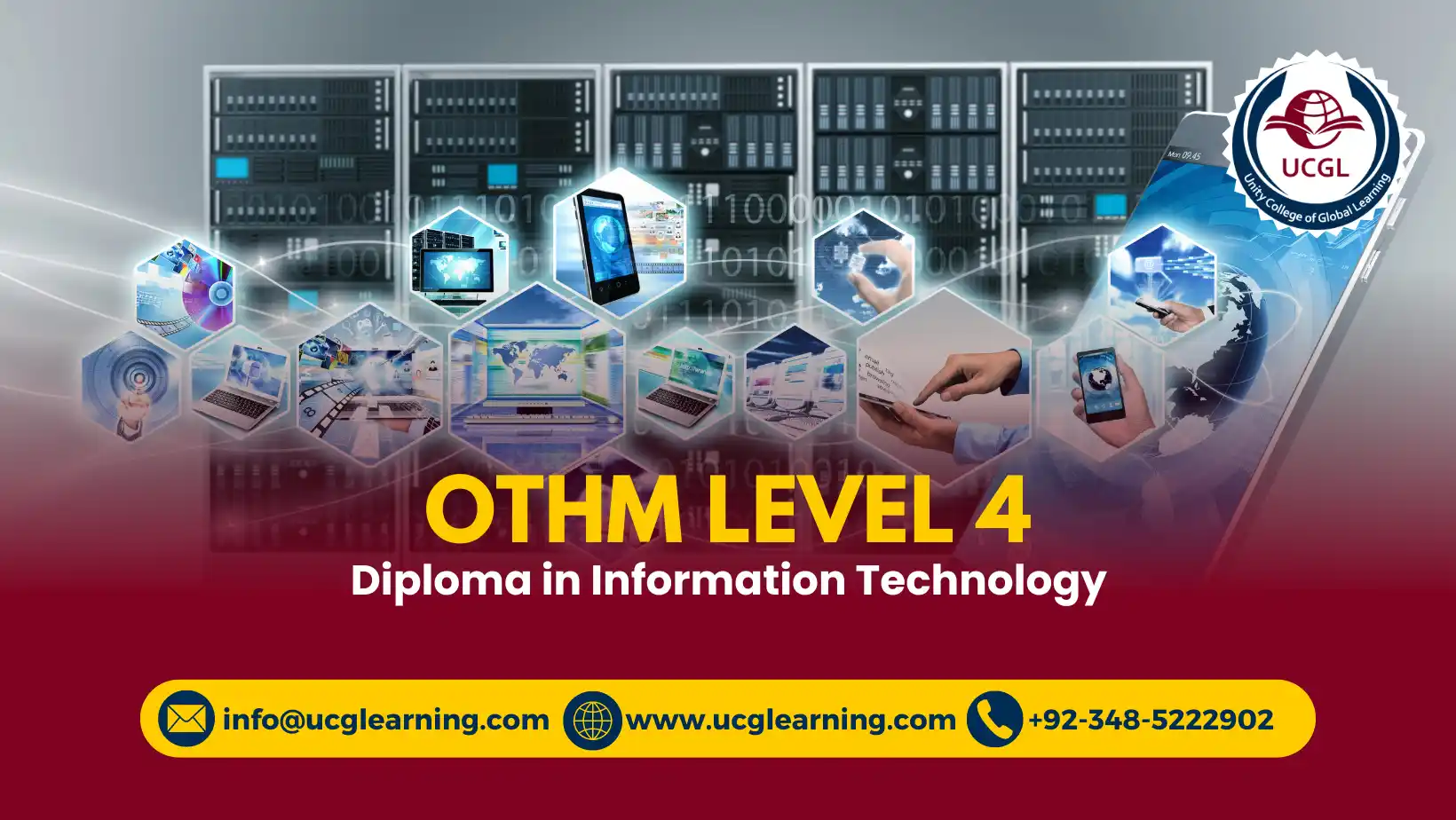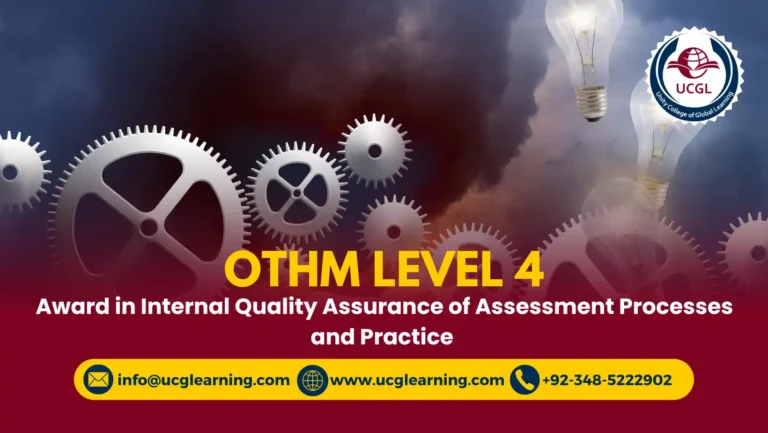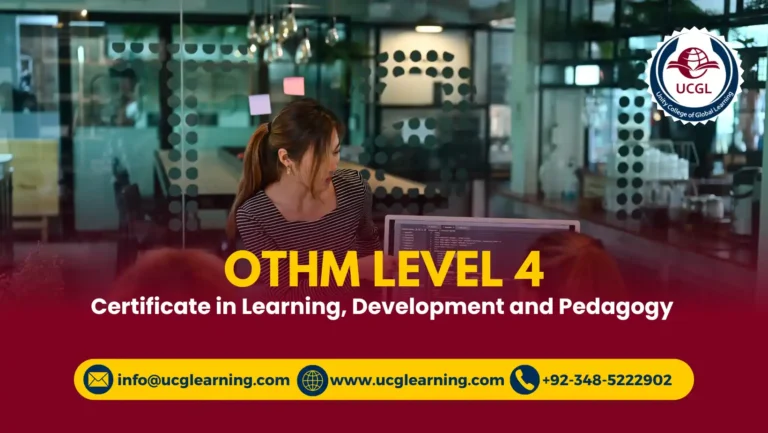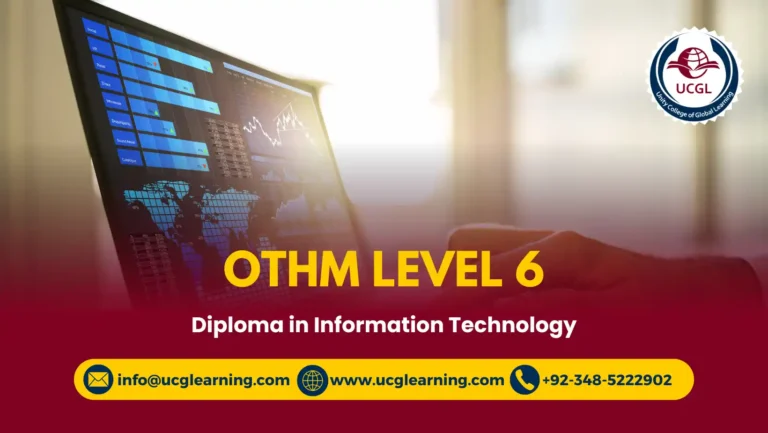OTHM Level 4 Diploma in Information Technology
This diploma provides a comprehensive understanding of key IT concepts and practices. It covers a broad range of topics including network management, software development, database systems, and IT security. The curriculum is designed to balance theoretical knowledge with practical skills, ensuring that graduates are well-prepared to tackle real-world IT challenges.
Course Introduction
The Level 4 Diploma in Information Technology is designed for individuals looking to advance their knowledge and skills in the dynamic and ever-evolving field of IT. Whether you’re aiming to start a career in IT, advance in your current role, or prepare for further study, this diploma offers a solid foundation in various IT disciplines. It caters to those who have a passion for technology and wish to stay abreast of the latest advancements and trends in the industry.
Course Benefits
- Enhanced IT Knowledge: Gain in-depth understanding of fundamental IT principles and practices.
- Practical Skills: Develop hands-on skills through practical assignments and projects.
- Career Advancement: Improve your employability and career prospects in the IT industry.
- Foundation for Further Study: Lay the groundwork for higher-level qualifications and specializations in IT.
- Industry-Relevant Curriculum: Learn from a curriculum that is updated regularly to reflect the latest industry trends and technologies.
Course Study Units
- Cyber Security (20 credits)
- Principles of Computer Programming (20 credits)
- Systems Analysis and Design (20 credits)
- Web and Mobile Applications (20 credits)
- Computer and Network Technology (20 credits)
- Managing Digital Information (20 credits)
Learning Outcomes
Principles of Education and Training (20 credits):
- Analyze and apply key principles and theories of education and training.
- Evaluate the impact of educational policies and practices on learners and stakeholders.
- Demonstrate an understanding of ethical considerations in education and training contexts.
- Critically reflect on personal teaching philosophies and adapt teaching strategies accordingly.
Design Education and Training Provision (20 credits):
- Design and develop effective curriculum and instructional materials based on educational theories and learner needs.
- Incorporate technology and innovative teaching methods to enhance learning outcomes.
- Adapt educational content and delivery methods to diverse learner needs and learning environments.
- Evaluate the effectiveness of instructional design in achieving educational objectives.
Engage Learners in Education and Training (20 credits):
- Implement strategies to motivate and engage learners effectively in the learning process.
- Foster a positive and inclusive learning environment conducive to learner participation and collaboration.
- Apply communication skills to facilitate effective interaction and feedback with learners.
- Assess learner engagement and make adjustments to teaching methods to optimize learning outcomes.
Plan, Allocate and Monitor Work in Own Area of Responsibility (20 credits):
- Develop comprehensive plans for educational activities and allocate resources efficiently.
- Monitor and evaluate the progress of educational projects or programs against predefined goals and objectives.
- Implement strategies to manage workload effectively and prioritize tasks to meet deadlines.
- Collaborate with stakeholders to ensure alignment of work plans with organizational goals and educational standards.
Evaluate Education and Training Provision (20 credits):
- Design and implement assessment strategies to evaluate learner performance and program effectiveness.
- Analyze assessment data to identify strengths and areas for improvement in educational provision.
- Utilize evaluation findings to make informed decisions and enhance educational outcomes.
- Communicate evaluation results effectively to stakeholders and implement recommendations for continuous improvement.
Professional Development and Reflection in Education and Training (20 credits):
- Engage in ongoing professional development activities to enhance teaching practice and knowledge base.
- Reflect critically on personal teaching experiences and incorporate feedback for professional growth.
- Demonstrate a commitment to lifelong learning and staying current with educational trends and best practices.
- Collaborate with peers and mentors to exchange ideas and insights for continuous improvement in education and training.
These learning outcomes are designed to provide a structured approach to developing knowledge, skills, and competencies in each respective area of study within education and training contexts.
Who is This Course For?
- Aspiring IT Professionals: Individuals looking to start a career in IT.
- Current IT Practitioners: Professionals seeking to update their skills and knowledge.
- Career Changers: Those wishing to transition into the IT industry from another field.
- Further Education: Students aiming to pursue higher-level IT qualifications.
Future Progression
Upon successful completion of the Level 4 Diploma in Information Technology, graduates can progress to higher-level qualifications such as:
- Level 5 Diploma in Information Technology
- Bachelor’s Degree in Information Technology or related fields
- Specialized Certifications in Networking, Security, or Software Development
This diploma also opens up career opportunities in various IT roles such as:
- IT Support Specialist
- Network Administrator
- Database Manager
- Software Developer
- Web Developer
- IT Security Analyst
The Level 4 Diploma in Information Technology is your gateway to a successful and fulfilling career in the IT industry. Embrace the opportunity to enhance your skills, knowledge, and career prospects with this comprehensive and industry-relevant qualification.







